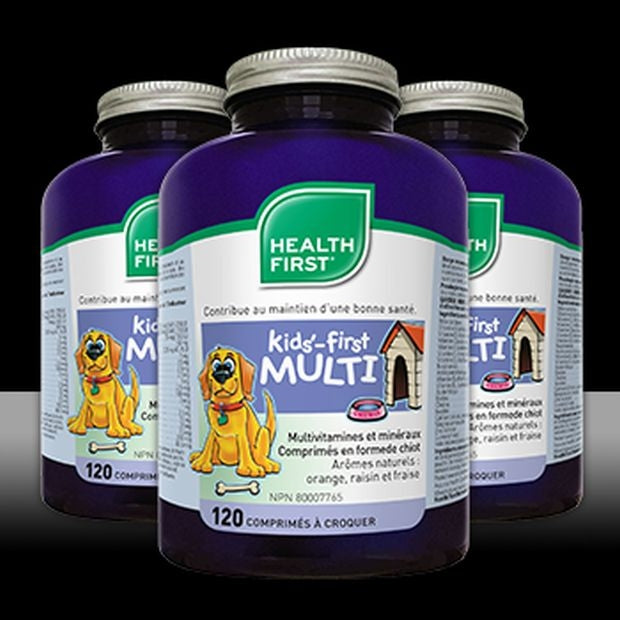Kid’s First Multi of Health First®
Childhood is a period of constant growth. The bones, the teeth, the skin, the muscles, the eyes and the brain, in fact, all the parts of the body that will serve us throughout life, develop during these years. Nutrition plays a big role in development, and vitamins, minerals and omega-3 are essential for it to be optimally done.
Of course, the best way for children to get the nutrients they need is healthy diet. Fruits and vegetables, legumes, lean meats, fish and dairy products are the most nutritious foods for growing children. The vitamins and minerals present in these foods arise in a form that our body recognizes and absorbs easily.
The challenge is to ensure that children eat healthy health. Most parents know how often children can be when it comes to diet. Even children with the best eating habits do not eat "perfectly" all the time. Foods processed and rich in bad fat and sugar dominate our cultivation and are designed to please children's taste buds and not necessarily to provide the nutrients necessary for optimal growth. In addition, most foods traditionally raised in nutrients, such as rice, have been stripped of many of their most precious nutritive content by our modern treatment methods.
There are several supplements that can provide essential nutrients to your children:
Multivitamins and minerals - Good multivitamin with crunching minerals, containing significant nutrients such as vitamin C, B vitamins, calcium, magnesium and vitamin D promotes health and acts as daily nutritional insurance. Vitamins and minerals promote immune health, maintaining vision, formation of bones, teeth, gums and tissues, as well as the metabolism of carbohydrates, lipids and proteins. Choose a multivitamin with minerals for children without artificial colors, aromas or conservation agents.
Vitamin C - A complementary contribution of this well -known vitamin is particularly important for children who do not consume enough fruits and vegetables. Vitamin C is important for the development and maintenance of bones, cartilages, teeth and gums of children. It is also important for the formation of connective tissues, accelerating the healing of wounds and improving the health of the immune system, as well as as protective antioxidant.
Calcium - This mineral contributes to the development and maintenance of bones and teeth, especially in children, adolescents and young adults. Calcium, vitamin D and magnesium collaborate as a bone strengthening team. Calcium complements are particularly important for children allergic to milk.
Vitamin complex B - Vitamins B are important for the nervous system, the formation of tissues and the metabolization of carbohydrates, fats and proteins. Children who consume a large amount of foods containing refined sugars and starchs can be depleted in B vitamins. Two vitamins B, folic acid and vitamin B12, participate in the formation of red blood cells. Choline, a nutritious element often associated with vitamins B, has been the subject of its effectiveness in helping children fill neurological development differences.
The following nutrients are also important:
- Vitamin A and beta-carotene-These related compounds play an important role in vision maintenance, the development of night vision and the health of the immune system.
- Magnesium - This mineral collaborates with calcium in the development of bones and the functioning of muscles.
- Chrome - This mineral helps the body to metabolize fat and carbohydrates and it supports healthy metabolization of glucose.
- Iodine - iodine helps the thyroid gland to work better.
- Zinc - Zinc participates in the maintenance of immune function and skin health.
Vitamin D -During the winter months, the additional vitamin D found in typical multi-vitamins for children may be necessary. Although all Canadians are at risk of vitamin D deficiency, children are particularly affected by this risk. A study carried out in 2009 published in the journal Pediatrics presented worrying results concerning vitamin D levels in American children. This study concluded that 7 out of 10 children had an insufficient vitamin D rate and that almost 10% of children suffered from deficiency. The main researcher of the study said: "We expected the proportion of vitamin D deficiency to be high, but the extent of the country's problem is shocking. »»1 In addition, Canadian children live further north and are therefore exposed to even fewer hours of sunshine in winter. During the winter months, many health professionals recommend 1000 IU per day of vitamin D for all Canadians. In addition, more recent studies have looked into the benefits of vitamin D for children's immune health.2
As a parent, you want to choose a purified fish oil supplement that has been cleaned and tested to ensure that it is free from contaminants such as heavy metals that are found in our oceans. The International Fish Oil Standards (IFOS) is an independent organization that displays the results of quality and safety tests that it performs on fish oils on its consumers: consumers:www.ifosprogram.com.
Sources
1. Alarm Bells Over Vitamin d Levels in Kids, CBS News. August 3, 2009.
2. Walker, Vp. Modin RL. The Vitamin D Connection to Pediatric Infections and Immune Function. Pediatr res. 2009 May; 65 (5 pt 2): 106r-113r.
3. Singh M., Essential Fatty Acids, Dha and Human Brain. Child Care and Dental Health Center, Arun Vihar, Noida, Up, India. meharbans.singh@gsk.com. Indian J Pediatr. 2005 Mar; 72 (3): 239-42.
4. Hill A. Fish Oil Diet Feeds Brains of Toddlers: Study Shows Omega-3 Improves Pre-School Learning Skills. The observer uk. Jul 17, 2005. http://observer.guardian.co.uk/uk_News/story/0,1530193.00.html


